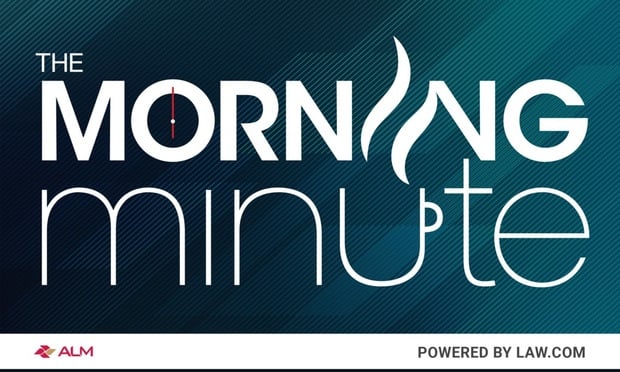Firms' Future Remote Plans, Internal ALSPs' Popularity, Big Law AG Practices: The Morning Minute
Here's the news you need to start your day.
October 23, 2020 at 06:00 AM
5 minute read
Want to get this daily news briefing by email? Here's the sign-up.
WHAT WE'RE WATCHING
OFFICES ARE OVERRATED - Even though COVID-19 is still spreading around the globe, some law firms are mapping out their post-pandemic work arrangements. As part of its "Work Smart Plus" policy, DLA Piper has moved to allow its non-U.S. employees—including partners—to work two days per week away from the office, subject to their manager's approval, Simon Lock reports. The updated policy, which took into account lessons learned from the pandemic, won't come into effect until after the health crisis subsides. DLA Piper, however, isn't the only firm that's settled on its remote work future. In August, Linklaters enacted a policy allowing all its global employees to work remotely for up to 20-50% of their time. Many other firms, such as Slaughter and May and Davis Wright Tremaine are currently reviewing their flexible work policies as well.
FIRMS' ALSP MOMENT? – As the pandemic forces corporate legal departments to do even more with less, law firms' internal alternative legal services providers (ALSPs) are becoming more popular. Womble Bond Dickinson's GC Solutions, a contract attorney service started three years ago that offers uniform hourly rates and alternative fee arrangements specifically for corporate work, has seen billings increase 11% since March, and revenue jump 33% year over year, Meredith Hobbs reports. Jamie Francis, the Womble corporate partner who leads GC Solutions, said there's been higher demand for the ALSP to handle large internal corporate projects that budget-constrained legal departments don't have the capacity to take on themselves. While firm ALSPs are not common across the industry, a recent report found that at least 35 such entities exist among the AmLaw 100.
BIG LAW AG BUSINESS - With the Trump Administration reining in federal enforcement actions, state attorneys general have stepped up to fill the void—and many in Big Law have taken note. Once a niche area, state attorney general practices are increasingly becoming a staple for many large U.S. law firms, Dylan Jackson reports. The proliferation of these practices is also likely to continue no matter who wins the White House this November. While state attorneys general have recently become more active and emboldened, their strength and visibility have been steadily growing over the past two decades. Still, lawyers caution that the demands of a state attorney general practice are unique and can't just be met by regulatory, commercial litigation or antitrust attorneys.
EDITOR'S PICKS
New Program Calls On Managing Partners, General Counsel to Make 'Personal Commitments' to Diversity
This content has been archived. It is available through our partners, LexisNexis® and Bloomberg Law.
To view this content, please continue to their sites.
Not a Lexis Subscriber?
Subscribe Now
Not a Bloomberg Law Subscriber?
Subscribe Now
NOT FOR REPRINT
© 2025 ALM Global, LLC, All Rights Reserved. Request academic re-use from www.copyright.com. All other uses, submit a request to [email protected]. For more information visit Asset & Logo Licensing.
You Might Like
View All
'Better of the Split': District Judge Weighs Circuit Divide in Considering Who Pays Decades-Old Medical Bill

K&L Gates Files String of Suits Against Electronics Manufacturer's Competitors, Brightness Misrepresentations
3 minute read
Ill. Class Action Claims Cannabis Companies Sell Products with Excessive THC Content
4 minute read
Plaintiffs Attorneys Awarded $113K on $1 Judgment in Noise Ordinance Dispute
4 minute readLaw Firms Mentioned
Trending Stories
- 1The Public-Private Dichotomy in State-Created Insurance Entities
- 2How I Made Practice Group Chair: 'It’s a Job About People, First and Foremost,' Says Alexander Lees of Milbank
- 3Morris Nichols Names New Chief Financial Officer
- 4People in the News—Jan. 24, 2025—Klehr Harrison, Willig Williams
- 5Best Practices for Conducting Workplace Investigations: A Legal and HR Perspective
Who Got The Work
J. Brugh Lower of Gibbons has entered an appearance for industrial equipment supplier Devco Corporation in a pending trademark infringement lawsuit. The suit, accusing the defendant of selling knock-off Graco products, was filed Dec. 18 in New Jersey District Court by Rivkin Radler on behalf of Graco Inc. and Graco Minnesota. The case, assigned to U.S. District Judge Zahid N. Quraishi, is 3:24-cv-11294, Graco Inc. et al v. Devco Corporation.
Who Got The Work
Rebecca Maller-Stein and Kent A. Yalowitz of Arnold & Porter Kaye Scholer have entered their appearances for Hanaco Venture Capital and its executives, Lior Prosor and David Frankel, in a pending securities lawsuit. The action, filed on Dec. 24 in New York Southern District Court by Zell, Aron & Co. on behalf of Goldeneye Advisors, accuses the defendants of negligently and fraudulently managing the plaintiff's $1 million investment. The case, assigned to U.S. District Judge Vernon S. Broderick, is 1:24-cv-09918, Goldeneye Advisors, LLC v. Hanaco Venture Capital, Ltd. et al.
Who Got The Work
Attorneys from A&O Shearman has stepped in as defense counsel for Toronto-Dominion Bank and other defendants in a pending securities class action. The suit, filed Dec. 11 in New York Southern District Court by Bleichmar Fonti & Auld, accuses the defendants of concealing the bank's 'pervasive' deficiencies in regards to its compliance with the Bank Secrecy Act and the quality of its anti-money laundering controls. The case, assigned to U.S. District Judge Arun Subramanian, is 1:24-cv-09445, Gonzalez v. The Toronto-Dominion Bank et al.
Who Got The Work
Crown Castle International, a Pennsylvania company providing shared communications infrastructure, has turned to Luke D. Wolf of Gordon Rees Scully Mansukhani to fend off a pending breach-of-contract lawsuit. The court action, filed Nov. 25 in Michigan Eastern District Court by Hooper Hathaway PC on behalf of The Town Residences LLC, accuses Crown Castle of failing to transfer approximately $30,000 in utility payments from T-Mobile in breach of a roof-top lease and assignment agreement. The case, assigned to U.S. District Judge Susan K. Declercq, is 2:24-cv-13131, The Town Residences LLC v. T-Mobile US, Inc. et al.
Who Got The Work
Wilfred P. Coronato and Daniel M. Schwartz of McCarter & English have stepped in as defense counsel to Electrolux Home Products Inc. in a pending product liability lawsuit. The court action, filed Nov. 26 in New York Eastern District Court by Poulos Lopiccolo PC and Nagel Rice LLP on behalf of David Stern, alleges that the defendant's refrigerators’ drawers and shelving repeatedly break and fall apart within months after purchase. The case, assigned to U.S. District Judge Joan M. Azrack, is 2:24-cv-08204, Stern v. Electrolux Home Products, Inc.
Featured Firms
Law Offices of Gary Martin Hays & Associates, P.C.
(470) 294-1674
Law Offices of Mark E. Salomone
(857) 444-6468
Smith & Hassler
(713) 739-1250









